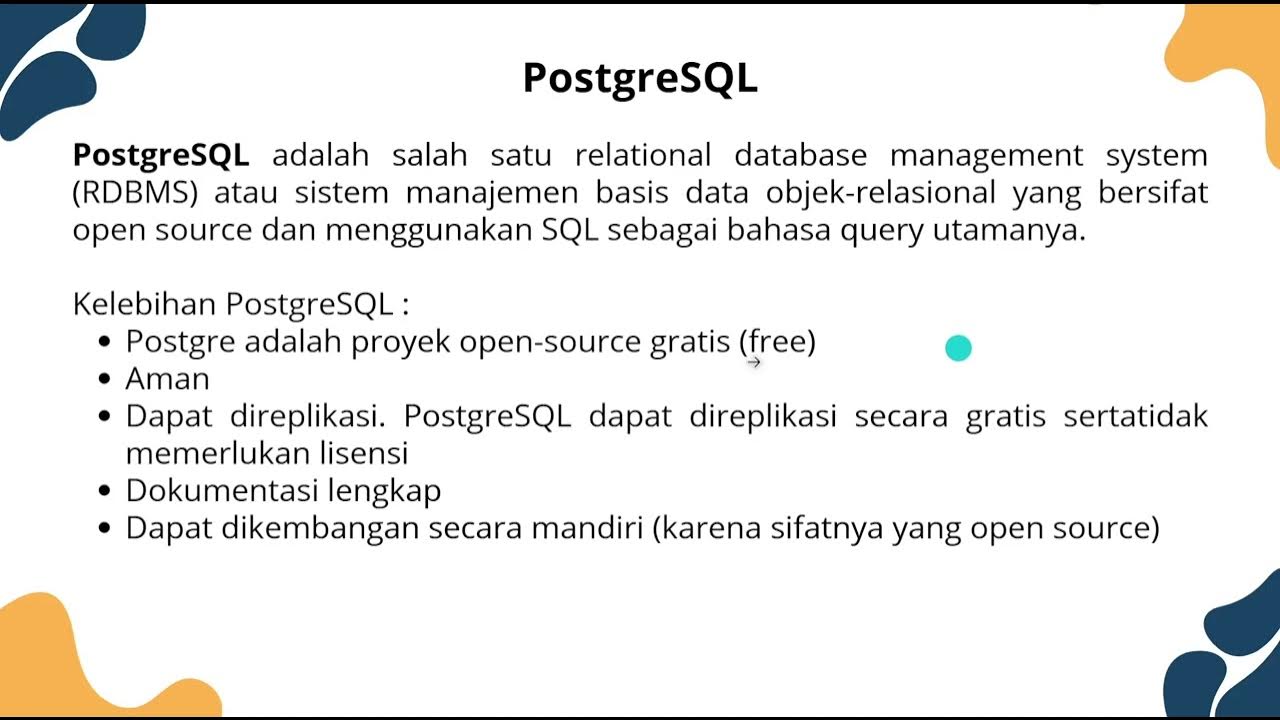SQL vs NoSQL in 2024 Make the Right Choice (Difference Explained)
Summary
TLDRIn this video, Daniel explores the intricacies of choosing between SQL and NoSQL databases for your project. He explains the key features of SQL databases, known for their structured query language and ACID properties, which are ideal for complex data processing and structured data. He contrasts this with NoSQL databases, highlighting their flexibility with unstructured data, scalability, and various data modeling types like document, key-value, and graph. Daniel discusses the pros and cons of each, emphasizing SQL's structured queries and ease of use versus NoSQL's scalability and schema flexibility. He advises choosing based on project requirements, suggesting SQL for structured data with defined relationships and NoSQL for high-performance, scalable applications.
Takeaways
- 🔍 **SQL vs NoSQL Overview**: Daniel introduces the comparison between SQL (Structured Query Language) and NoSQL databases, explaining their purposes and suitability for different project needs.
- 📊 **SQL Databases**: SQL databases are relational, storing data in tables, and are known for their structured schema and ACID properties ensuring data integrity.
- 📚 **Types of SQL Databases**: Common SQL databases mentioned include Oracle, Microsoft SQL Server, PostgreSQL, and MySQL.
- 🌐 **NoSQL Databases**: NoSQL databases are non-relational, offering a dynamic schema and various data modeling formats like column-oriented, key-value, document, and graph databases.
- 🔑 **NoSQL Examples**: Popular NoSQL databases include MongoDB, Cassandra, Redis, and Amazon Neptune.
- ⚙️ **SQL Advantages**: SQL databases offer well-structured queries, ease of use, flexibility with data types, and compatibility with popular programming languages.
- 🚀 **NoSQL Advantages**: NoSQL databases provide easy scalability, swift updates and queries, flexible schemas, and support for non-structured data.
- 🚧 **SQL Limitations**: SQL databases can face limitations in scalability, data structuring, and flexibility due to their fixed schema.
- 💡 **NoSQL Limitations**: NoSQL databases may have more complex queries and less support for transactions compared to SQL databases.
- 🏁 **Final Thoughts**: The choice between SQL and NoSQL should be based on project requirements, considering factors like data structure, scalability, performance, and security needs.
Q & A
What is the main difference between SQL and NoSQL databases?
-The main difference is that SQL databases are relational, storing data in tables with rows and columns, while NoSQL databases are non-relational and can store data in various formats such as documents, key-value pairs, wide-column stores, and graphs.
What does SQL stand for and what is its purpose?
-SQL stands for Structured Query Language, and it is a programming language used to manage and manipulate data in relational databases.
What are the four key principles that SQL databases are based on?
-SQL databases are based on four key principles known as ACID: Atomicity, Consistency, Isolation, and Durability.
What are some popular SQL databases mentioned in the script?
-Some popular SQL databases mentioned are Oracle, Microsoft SQL Server, PostgreSQL, and MySQL.
How do NoSQL databases handle schema compared to SQL databases?
-NoSQL databases support a dynamic schema, which allows for unstructured data and makes modifications easier, whereas SQL databases have a strict schema that requires data to be organized and structured before use.
What are the four main types of NoSQL databases?
-The four main types of NoSQL databases are: Document stores, Key-value stores, Column-oriented stores, and Graph databases.
What is CAP Theory and how does it relate to NoSQL databases?
-CAP Theory states that a distributed system cannot simultaneously guarantee Consistency, Availability, and Partition tolerance. NoSQL databases often prioritize Availability and Partition tolerance over Consistency.
What are some advantages of SQL databases?
-Advantages of SQL databases include well-structured queries, ease of use, flexibility with various data types, and compatibility with popular programming languages.
What are some limitations of SQL databases?
-Limitations of SQL databases include limited scalability, challenges with unstructured or frequently changing data, and limited flexibility due to a fixed schema.
What are some advantages of NoSQL databases?
-Advantages of NoSQL databases include easy horizontal scalability, swift updates and queries on large data sets, flexible schemas, and support for non-structured data.
What are some limitations of NoSQL databases?
-Limitations of NoSQL databases include more complex queries, less support for transactions, and often less robust security features compared to SQL databases.
When might you choose to use a SQL database over a NoSQL database?
-You might choose a SQL database when your project requires structured data with defined relationships, complex queries, and transaction management.
When might you choose to use a NoSQL database over a SQL database?
-You might choose a NoSQL database for high-performance, scalable applications, and when dealing with semi-structured or unstructured data with loosely defined relationships.
Outlines

This section is available to paid users only. Please upgrade to access this part.
Upgrade NowMindmap

This section is available to paid users only. Please upgrade to access this part.
Upgrade NowKeywords

This section is available to paid users only. Please upgrade to access this part.
Upgrade NowHighlights

This section is available to paid users only. Please upgrade to access this part.
Upgrade NowTranscripts

This section is available to paid users only. Please upgrade to access this part.
Upgrade Now5.0 / 5 (0 votes)





